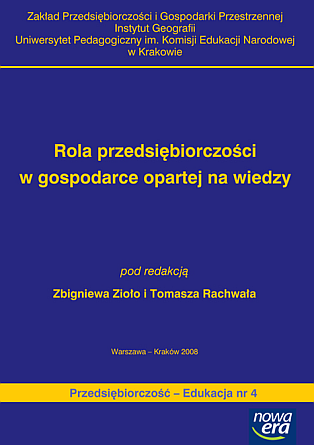The Project of the Base for Curriculum of "Basis for Entrepreneurships" Classes in General High Schools, Profiled High Schools and Technical High Schools
DOI:
https://doi.org/10.24917/20833296.4.32Keywords:
projekt, podstawa, programowa, podstawy przedsiębiorczościAbstract
The team of scholars from Cracow University of Economics and Pedagogical Universityof Cracow headed by T. Rachwa³ and under auspices of Komisja Nadzoru Finansowego, mindfulof modern trends in the development of civilization and consequential need to form the entrepre-neurial attitudes on all stages of human growth, has developed the new concept of the base forcurriculum of basis for entrepreneurships classes in general high schools, profiled high scho-ols and technical high schools. The curriculum will be the fundament for the including thissubject to he Matura exam (lack of the curriculum prevent it from including now). So the numberof optional exams will be bigger and this is the important matter for the students of profiled highschools and technical high schools who have fewer lessons then the other students on thesubject required on Matura exam and have no possibilities to get a grade for neither economicsubject. Besides the including it to Matura exam will allow to count this grade as a factor duringthe recruitment procedures into the higher economical schools, will enhance the opportunitiesfor the graduates and will improve the role of economic education in the eyes of people, and willpopularize the entrepreneurial attitudes in Poland (this is one of the few of developed countrywhere this is impossible). Besides the prestige in the structure of school education probably willbe improved and the level of the teaching this subject will be enhanced, and the teachers will bebetter prepared.Downloads
Published
2008-01-01
How to Cite
Rachwał, T., Kudełko, J., Tracz, M., Wach, K., & Kilar, W. (2008). The Project of the Base for Curriculum of "Basis for Entrepreneurships" Classes in General High Schools, Profiled High Schools and Technical High Schools. Entrepreneurship – Education, 4, 322–334. https://doi.org/10.24917/20833296.4.32
Issue
Section
Articles
License
Articles are published under the terms of the Creative Commons License (CC BY-ND 4.0; Attribution– NoDerivs).

